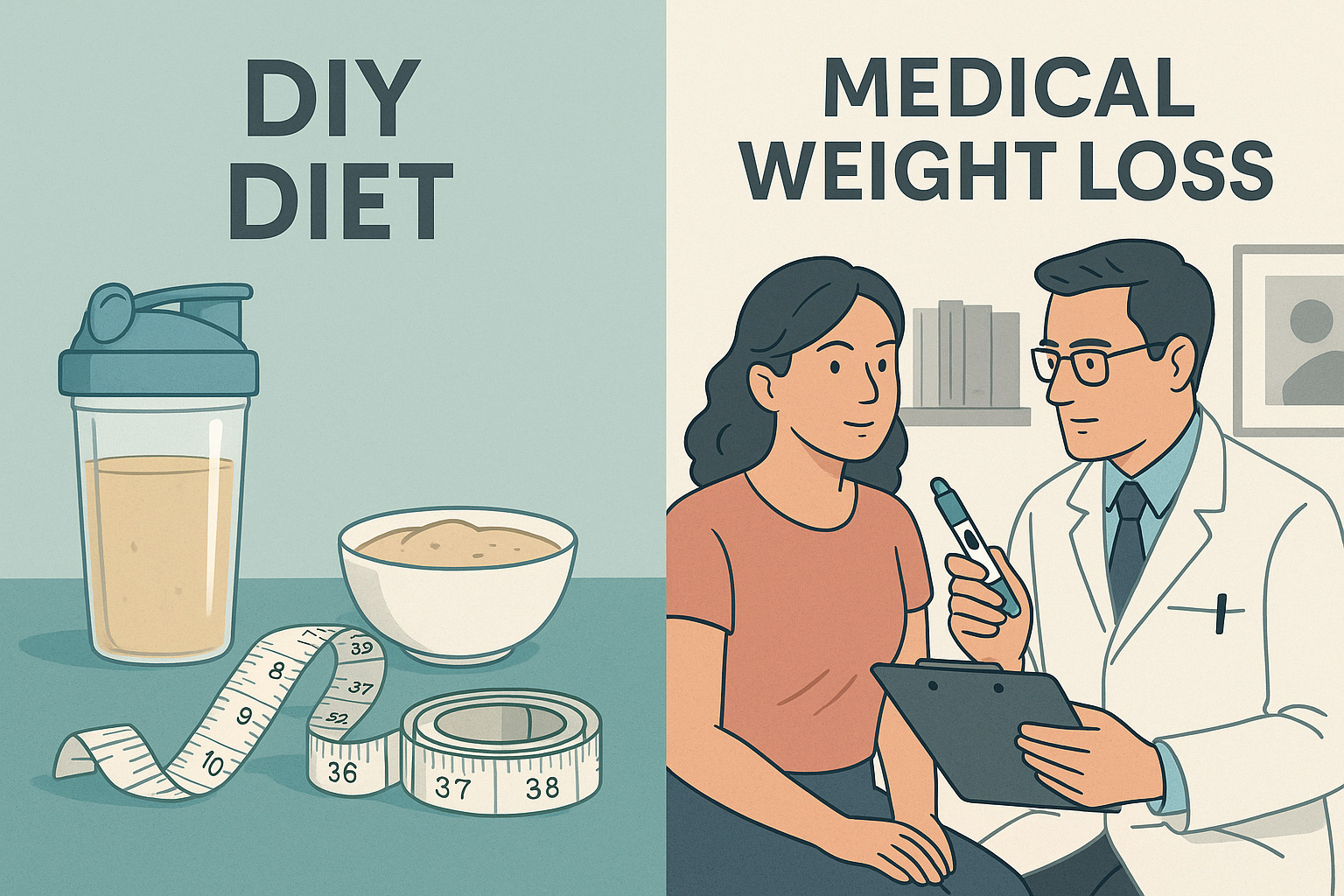Most people do not start a new diet with the assumption they will fail. At the start, there is usually a level of hope, maybe even excitement. You find a plan that feels attainable, you commit, and you start with enthusiasm. The pounds drop, you feel good, and for a moment, it seems that this time will be different. But then comes the stall, and the weight comes back. Often, that is the part that nobody tells you about.
So, if motivation and effort aren’t the problem, what is?
Lasting weight loss is rarely about willpower alone. It’s about how your body responds to weight changes. More people are realizing that working with biology through medical weight loss programs is the key to finally moving forward.
The DIY Diet Dilemma: Why Quick Fixes Fail
DIY diets seem like a smart shortcut. You don’t have to book appointments or talk to anyone about your goals. Just follow the plan: cut carbs, count points, drink shakes, and skip meals. If you eat less, you’ll lose more, and that’s true, but only for a while.
Why So Many Diets Stall or Reverse
A meta-analysis of 29 long-term studies showed that up to 79.7% of people regained weight within five years on low-calorie diets, and even the best outcomes showed only 5 to 15 lb of weight kept off. Not because they “cheated,” but because the body pushes back, slowing metabolism, increasing hunger, and doing whatever it can to return to its set point.
There’s also the emotional side of dieting that gets overlooked. When a plan feels too extreme or unsustainable, it becomes harder to stick with, even if the numbers on the scale start to drop.
The Cost of Repeating the Cycle
Rapid weight loss can trigger more than just burnout. It may increase your risk of gallstones, especially when weight drops quickly without medical guidance.
Weight cycling, which refers to losing and regaining weight repeatedly, has been linked to higher risks of heart complications over time. That makes the “just do another diet” advice feel not only frustrating, but unfair.
The Science Behind the Struggle
The body has its own opinion about weight changes, and it’s surprisingly stubborn.
There are a few key hormones involved in appetite and metabolism. One is ghrelin, which increases when you’re losing weight, making you feel hungrier. Another is leptin, which usually tells your brain you’re full.
But as weight drops, leptin levels drop, too, so fullness becomes harder to recognize. Your body reacts exactly as it was designed to by trying to restore balance.
Scientists also talk about a “set point,” a weight range your body prefers to stay in. When you dip below that, your system kicks into gear to bring you back up. That’s why keeping weight off feels harder than losing it in the first place.
So, when you’re cutting calories, battling cravings, and watching the scale bounce, you’re not just being tested mentally. You’re going up against a coordinated biological response that resists change.
What Medical Weight Loss Programs Do Differently
Instead of guessing or going it alone, medical weight loss programs offer something structured, supervised, and built around your unique biology.
Not Just Another Meal Plan
Think of it as a treatment approach, rather than a “diet” in the traditional sense. It often starts with a medical evaluation: lab work, health history, and sometimes even hormone testing. That gives your care team a fuller picture of what might be affecting your weight. Then, they build a plan from there.
That plan may include nutrition coaching, behavior support, and, in some cases, prescription weight loss medications that help rebalance the hormones working against you.
The Role of Semaglutide and Similar Tools
You’ve probably come across the names Ozempic and Wegovy. Both are brand names for semaglutide, a medication originally developed to help with blood sugar but now also used in medical weight management. It’s designed to act like a hormone your body already makes, one that plays a role in regulating hunger and digestion.
Some people on semaglutide notice that food feels more filling, while others say their cravings fade a little. It doesn’t work the same for everyone, but it often makes sticking to healthy changes less of a fight. Still, the medication isn’t the whole answer. Real progress comes when it’s combined with daily habits and medical support.
In a 33-month trial of 17,604 adults with obesity and heart disease, but no diabetes, semaglutide 2.4 mg weekly reduced the risk of heart attack, stroke, or cardiovascular death by 20%, alongside reductions in weight and waist size.
There’s also tirzepatide, another option that’s getting attention. Some recent studies suggest that when people continue using it after an initial weight loss phase, they’re more likely to maintain or even improve their progress. Pausing the medication, on the other hand, often leads to the weight coming back.
The big idea here is that these medications aren’t about tricking your body. They’re about working with it. They help reset the balance between hunger, fullness, and energy use, making long-term change feel more possible.
You Don’t Have to Go It Alone Anymore
You’ve likely heard people say, “Just eat less, move more.” That advice may have made you feel like you weren’t trying hard enough. But it misses the point.
When you understand how complex weight regulation really is, the need for support becomes obvious. Medical weight loss takes that complexity seriously. It uses proven tools, expert insight, and science to help people achieve goals they’ve struggled with for years.
If you’ve done the DIY thing and it hasn’t worked, that doesn’t mean you failed. It means you’re ready for something smarter.
Let’s Talk About What’s Next
If you’ve been searching for a weight loss doctor near you, Zeam Health & Wellness’ primary care team can guide you through a safe, physician-led approach in Folsom and Roseville. We don’t treat weight as a willpower problem; we look at the biology behind it and create plans that fit your life.
Whether you’re curious about Ozempic, considering semaglutide, or simply ready to break away from short-term diets, our team is here to walk you through real options. Schedule a consultation today and take the first step toward a program built around you.
Key Takeaways
- Most diets fail long-term — up to 79.7% of people regain weight within five years of starting a low-calorie diet, highlighting how biology resists sustained weight loss. [1]
- Weight cycling carries health risks — repeated cycles of losing and regaining weight are linked to gallstones and increased cardiovascular complications. [2]
- The body defends its “set point” — hormones like ghrelin rise during weight loss to increase hunger, while leptin drops, reducing satiety signals and driving weight regain. [3]
- Medical weight loss programs address biology — supervised care includes lab work, personalized nutrition, behavioral support, and prescription options that rebalance appetite and metabolism. [4]
- Semaglutide provides dual benefits — in a large 33-month trial of 17,604 adults, weekly semaglutide reduced risk of cardiovascular death, heart attack, or stroke by 20%, alongside significant weight loss. [5]
- Tirzepatide supports weight maintenance — studies show continuing therapy after initial weight loss helps sustain or improve progress, while stopping often leads to weight regain. [4]
- The goal is not willpower, but alignment — medications like semaglutide and tirzepatide help patients work with their biology, making sustainable lifestyle changes easier to maintain. [4][5]
References
[1] Sumithran P, et al. Long-term weight regain after low-calorie diets: systematic review and meta-analysis. Am J Med. 2023 【ScienceDirect†source】
[2] Wing RR, et al. Weight cycling and health risks. JAMA Netw Open. 2024 【JAMA Network†source】
[3] Medical News Today. Set point weight: What to know about body weight regulation. 2023 【MedicalNewsToday†source】
[4] Wilding JPH, et al. Tirzepatide and semaglutide in weight management trials. N Engl J Med. 2023 【NEJM†source】
[5] Lincoff AM, et al. Semaglutide and cardiovascular outcomes in obesity without diabetes. JAMA. 2023 【JAMA†source】




